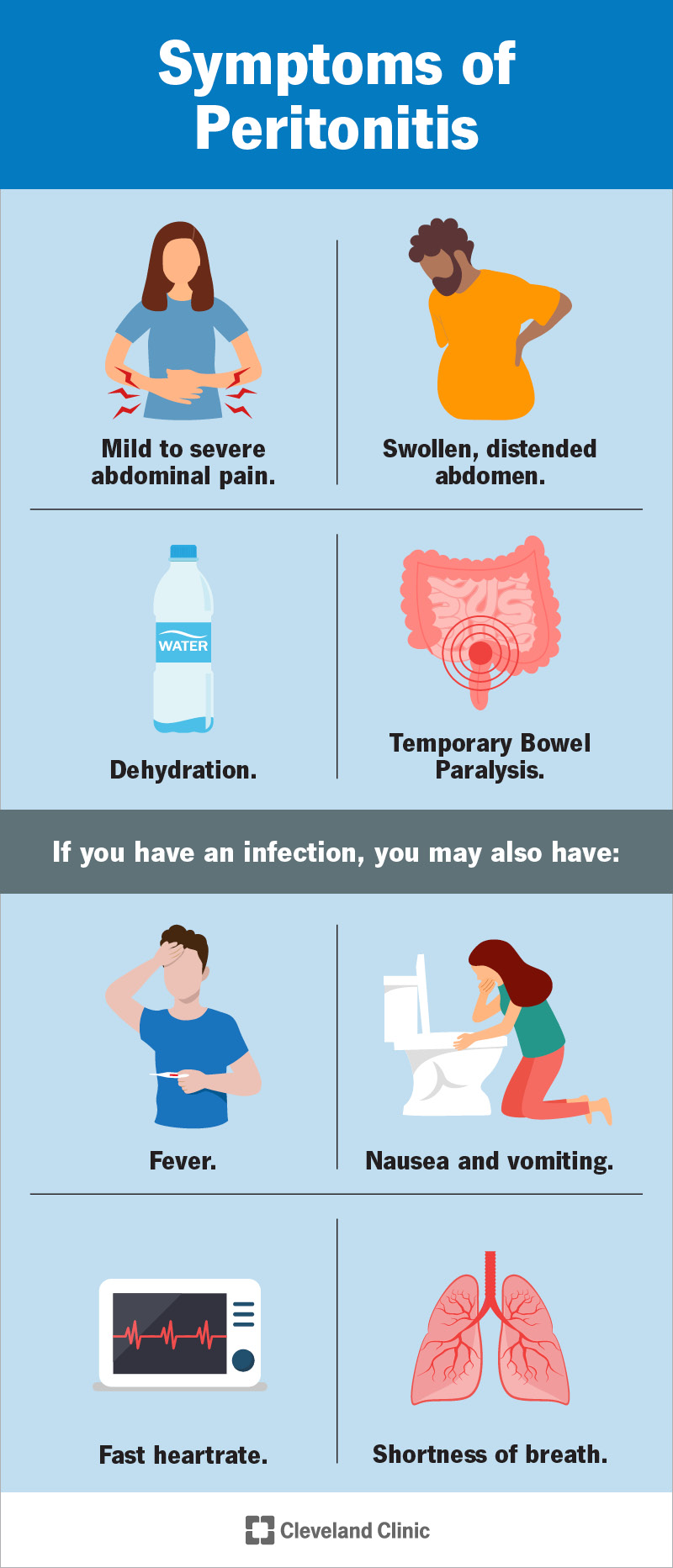Peritonitis is inflammation in your peritoneum. This is the tissue that lines the inside of your belly. Sudden, severe belly pain is a common symptom. Bacterial infections often cause peritonitis. But it can happen if fluids from nearby organs leak into your peritoneum. Peritonitis is a medical emergency that can cause life-threatening complications.
Advertisement
Cleveland Clinic is a non-profit academic medical center. Advertising on our site helps support our mission. We do not endorse non-Cleveland Clinic products or services. Policy
Peritonitis is severe inflammation in the thin membrane (peritoneum) that lines the inside of your belly. It’s a serious condition that typically happens when you have a bacterial infection in your peritoneum.
Advertisement
Cleveland Clinic is a non-profit academic medical center. Advertising on our site helps support our mission. We do not endorse non-Cleveland Clinic products or services. Policy
Severe inflammation in your peritoneum triggers a series of changes in your body that may cause sepsis. This is a life-threatening condition that can happen when your body has an extreme reaction to an infection.

Image content: This image is available to view online.
View image online (https://my.clevelandclinic.org/-/scassets/Images/org/health/articles/17831-peritonitis)
One common and serious symptom is a dull ache in your belly that suddenly becomes a sharp pain and doesn’t let up. The pain can be so intense that you can’t sit still. If that’s your situation, call 911 (or your local emergency service number) or have someone take you to the emergency room.
Other peritonitis symptoms may include:
Bacterial infections are the most common cause of peritonitis. Some start in your peritoneum (primary infections). But most happen when a bacterial infection in a nearby organ spreads to your peritoneum. Healthcare providers call these secondary infections.
You may also develop peritonitis if fluid from nearby organs leaks into your peritoneum (bowel perforation). The fluid causes inflammation. Providers may call this chemical peritonitis.
Advertisement
These infections happen when you have a condition that damages organs close to your peritoneum. Your damaged organs may release infected fluid that seeps into your peritoneum. This can happen if you have:
Primary infections start in your peritoneum. They usually happen in one of two ways:
There are fluids in your body that are harmless when they stay where they belong. But they can cause inflammation if they end up in your peritoneum. This can happen if you have conditions like:
The most common and most serious complications are septicemia and sepsis. These conditions are life-threatening medical emergencies. Other potential complications are:
A healthcare provider will ask about your symptoms. They’ll also ask if you’re receiving treatment for any medical conditions. They’ll do a physical exam that focuses on your belly. They’ll check to see if your belly is extremely tender to their touch or is swollen and tight
Your provider may do blood tests that detect inflammation and infection. For example, they may check for leukocytosis (high white blood cell count). A high white blood cell count is a sign that your body is fighting infection or inflammation. They may do other tests like:
Advertisement
Treatment starts with IV fluids and broad-spectrum antibiotics. IV fluids reduce your risk of shock. They help restore the balance of fluids in your body. Broad-spectrum antibiotics are the first line of defense against the infection in your peritoneum.
Your healthcare providers may do more blood tests. They’ll identify the bacterium or pathogen causing the infection. You may receive a different antibiotic that targets the specific bacterium or pathogen.
Your providers’ priority is preventing sepsis or septicemia. Next, they’ll focus on the specific bacterium or pathogen that triggered the infection. They’ll also treat the condition that led to bacteria ending up in your peritoneum.
Recovery time varies. You may recover from peritonitis within a few weeks if you receive treatment early on. But peritonitis often happens because you have an underlying condition. Recovering from that condition may take much longer.
Go to the emergency room or call 911 (or your local emergency services number) if you have sudden, severe belly pain. You may not have peritonitis. But belly pain that comes on fast (acute abdomen) is a medical emergency.
Advertisement
You can, but your recovery largely depends on how fast you receive a diagnosis and treatment. Early recognition is important to controlling peritonitis before it spreads. Treatment is usually effective, but some complications, such as organ damage, may be lasting.
Many things can make your belly hurt. Not all of them are medical emergencies. But don’t hesitate to call 911 or go to the emergency room if you have belly pain that doesn’t go away and suddenly gets worse. Your symptoms could mean you have peritonitis.
This condition is a medical emergency. It can develop very quickly and be life-threatening if you don’t get treatment right away. So, getting help as quickly as possible may save your life.
Advertisement
Learn more about the Health Library and our editorial process.
Cleveland Clinic's health articles are based on evidence-backed information and review by medical professionals to ensure accuracy, reliability, and up-to-date clinical standards.
Cleveland Clinic's health articles are based on evidence-backed information and review by medical professionals to ensure accuracy, reliability, and up-to-date clinical standards.
Whether you need stitches, a broken bone set or think your appendix might be causing your abdominal pain, Cleveland Clinic’s emergency medicine team is here to help.
